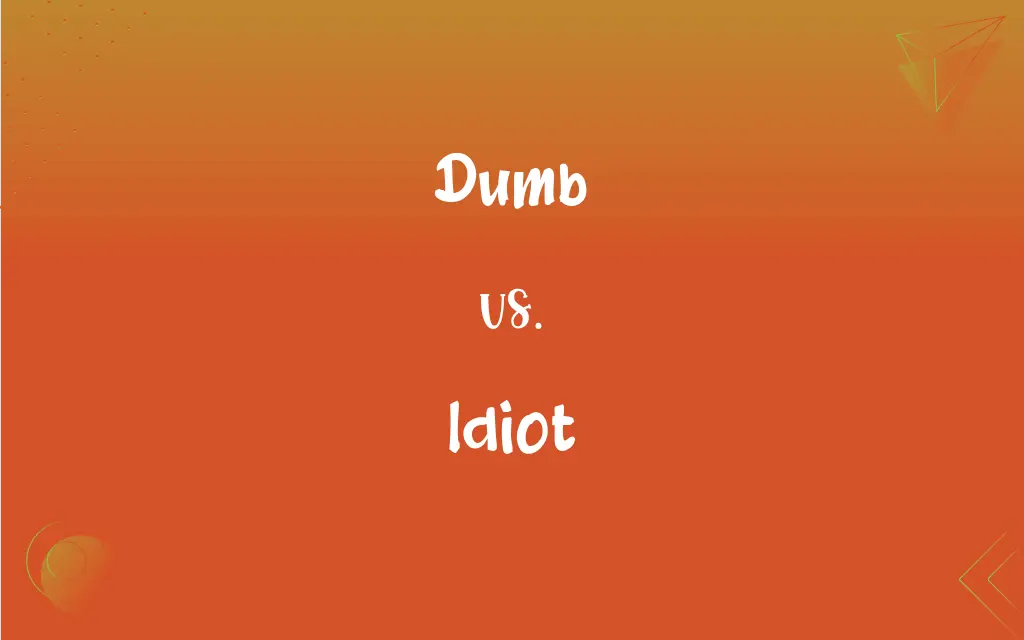Dumb vs. Idiot: What's the Difference?
Edited by Aimie Carlson || By Janet White || Published on January 12, 2024
"Dumb" originally referred to the inability to speak, often now used to imply a lack of intelligence or thoughtfulness. "Idiot" denotes someone with extremely low intelligence or poor decision-making.

Key Differences
Historically, "dumb" was used to describe someone who was mute or unable to speak. In modern usage, "idiot" refers to an individual perceived as having very low intelligence or showing exceptionally poor judgment.
"Dumb" can imply a temporary inability to articulate thoughts or ideas effectively. "Idiot," however, often suggests a more inherent or persistent lack of intelligence or rationality.
The term "dumb" is sometimes used colloquially to describe a decision or action that lacks foresight or wisdom. On the other hand, calling someone an "idiot" implies a harsher judgment of their intellectual capacity or behavior.
"Dumb" can also be used in a more light-hearted or self-deprecating manner, indicating a momentary lapse in judgment. "Idiot" is usually more offensive and is often perceived as an insult to one’s intelligence.
In educational or psychological contexts, both terms are considered outdated and insensitive, especially "idiot," which was once a term used in psychology to denote a specific level of intellectual disability.
ADVERTISEMENT
Comparison Chart
Original Meaning
Inability to speak
Extremely low intelligence
Modern Usage
Lack of thoughtfulness or intelligence
Poor decision-making, low intelligence
Severity
Less severe, can be temporary
More severe, implies a persistent state
Insult Level
Varies, often less harsh
Generally more offensive
Context Sensitivity
Considered insensitive, especially in educational contexts
Historically a psychological term, now derogatory
ADVERTISEMENT
Dumb and Idiot Definitions
Dumb
Dumb can imply a lack of intelligence.
That was a dumb mistake to make.
Idiot
Idiot can reflect impulsive or irrational behavior.
Running into traffic like that was idiotic.
Dumb
Dumb is often used to describe thoughtless actions.
It was dumb to leave the keys in the car.
Idiot
Idiot, used derogatorily, can be offensive.
It's not right to call someone an idiot for a simple mistake.
Dumb
Dumb can suggest a temporary lapse in judgment.
I felt dumb forgetting her name.
Idiot
Idiot is often used as an insult.
She called him an idiot in a moment of anger.
Dumb
Dumb originally meant unable to speak.
He was rendered dumb by the shock of the news.
Idiot
Idiot denotes extremely low intelligence.
He behaved like an idiot during the meeting.
Dumb
Dumb is sometimes used self-deprecatingly.
I can't believe I said that; how dumb!
Idiot
Idiot implies poor decision-making.
Only an idiot would ignore these warnings.
Dumb
Lacking the power of speech. Used of animals and inanimate objects.
Idiot
A person who is considered foolish or stupid.
Dumb
(Offensive) Incapable of using speech; mute. Used of humans. See Usage Note at mute.
Idiot
A person with profound intellectual disability having a mental age below three years and generally unable to learn connected speech or guard against common dangers. The term belongs to a classification system no longer in use and is now considered offensive.
FAQs
Can idiot have a legal definition?
Historically, yes, but it's no longer used in legal contexts.
Can idiot be a term of endearment?
Rarely, as it's typically an insult, though context and tone matter.
Is it ever appropriate to use these terms in professional settings?
No, using such language is unprofessional and can be harmful.
Is it acceptable to call someone dumb?
It's generally considered disrespectful and insensitive.
Are there cultural differences in the use of these words?
Yes, perceptions and acceptability can vary across cultures.
How should one respond to being called an idiot?
It’s best to address it calmly, expressing that it's inappropriate.
Can dumb and idiot be reclaimed positively?
While some attempt to reclaim them, they generally remain negative.
Can the usage of dumb and idiot contribute to stigma?
Yes, they can perpetuate negative stereotypes about intelligence.
Is it okay to use these words in artistic works?
Artistic expression may include them, but sensitivity and context matter.
Do these words appear in classic literature?
Yes, but often in historical contexts different from today.
Is 'dumb' used in medical terminology?
No, it's outdated and not used in modern medical contexts.
Are these terms ever used humorously?
Yes, but context is crucial to ensure it's not hurtful.
Should these words be taught to non-native English speakers?
They should be taught as part of comprehensive language education, with emphasis on their potential offensiveness.
Do these words have different meanings in British and American English?
The meanings are similar, though usage and connotations can vary.
Can these words be used in academic writing?
Generally, they are avoided due to their informal and derogatory nature.
Can dumb and idiot be considered hate speech?
In certain contexts, especially if targeting specific groups, they could be.
Is it harmful to use these words in jokes?
It can be, as it might perpetuate harmful stereotypes or offend others.
Are there more respectful alternatives to these words?
Yes, using terms like 'unwise' or 'ill-advised' is more respectful.
How do children understand these words?
Children often understand them as insults, though they may not grasp the full implications.
How have the meanings of these words evolved?
They've shifted from clinical to more colloquial, often derogatory meanings.
About Author
Written by
Janet WhiteJanet White has been an esteemed writer and blogger for Difference Wiki. Holding a Master's degree in Science and Medical Journalism from the prestigious Boston University, she has consistently demonstrated her expertise and passion for her field. When she's not immersed in her work, Janet relishes her time exercising, delving into a good book, and cherishing moments with friends and family.
Edited by
Aimie CarlsonAimie Carlson, holding a master's degree in English literature, is a fervent English language enthusiast. She lends her writing talents to Difference Wiki, a prominent website that specializes in comparisons, offering readers insightful analyses that both captivate and inform.































































